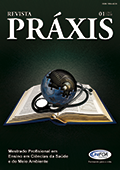Técnicas de uso do mapa conceitual para avaliação da aprendizagem significativa no ensino básico
DOI:
https://doi.org/10.47385/praxis.v14.n28.4142Resumo
A teoria da aprendizagem significativa (TAS) apresenta proposições para orientar um processo de ensino e aprendizagem mais eficiente. Para que ocorra a aprendizagem significativa, é preciso que o aprendiz demonstre predisposição para aprender e reconheça a existência de conhecimentos prévios relevantes. No início da década de 1970, o mapa conceitual (MC) foi desenvolvido como um instrumento para avaliação do conhecimento prévio e da aprendizagem significativa. Embora o MC apresente uma sólida fundamentação teórica e empírica, o seu uso ainda não é amplamente difundido no ensino básico brasileiro. Ademais, a escola é um ambiente autogerido e autocatalítico, que possui características e identidade únicas que possibilitam a renovação das ações pedagógicas. Logo, é plausível que o método de utilização dos MCs esteja sofrendo modificações em relação à proposta original com o fim de adequar o instrumento aos mais diversos contextos escolares. Assim sendo, o objetivo desse estudo é apresentar uma revisão crítica sobre o uso do MC no ensino básico e identificar se o propósito e as técnicas originárias têm sido empregados. O nosso levantamento mostra que o MC ainda é pouco estudado no ensino básico em comparação com o ensino superior. Ademais, os estudos apresentam inconsistência nos critérios e técnicas para a avaliação do conhecimento. Um direcionamento baseado na TAS e na técnica original para a construção/avaliação do MC poderia impactar a preferência pela ferramenta. Em síntese, recomendamos o MC como instrumento de avaliação formativa, recursiva e baseado nas técnicas propostas durante a sua concepção original apontadas neste presente estudo.











